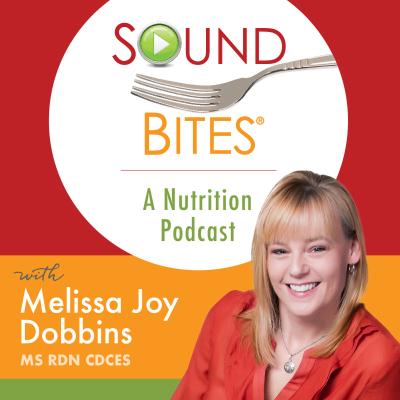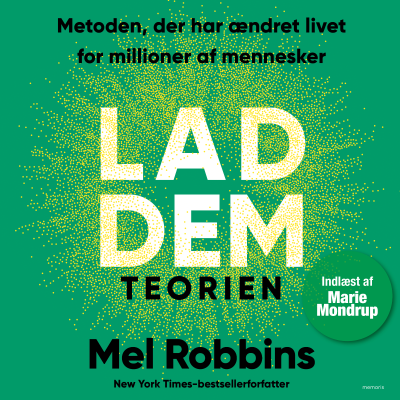
Sound Bites A Nutrition Podcast
engelsk
Sundhed & personlig udvikling
Begrænset tilbud
2 måneder kun 19 kr.
Derefter 99 kr. / månedOpsig når som helst.
- 20 lydbogstimer pr. måned
- Podcasts kun på Podimo
- Gratis podcasts
Læs mere Sound Bites A Nutrition Podcast
Hosted by award-winning Registered Dietitian Nutritionist, Melissa Joy Dobbins, the Guilt-Free RD - "because food shouldn't make you feel bad!" Join Melissa's conversations with a variety of experts on topics ranging from fad diets to farming and gain credible information to help you make your own, well-informed food decisions based on facts, not fear. For more information visit www.SoundBitesRD.com.
Alle episoder
313 episoder303: New DGAs: The Good, The Bad & The Upside Down – Alex Turnbull
Full shownotes, transcript and resources here: https://soundbitesrd.com/303 [https://soundbitesrd.com/303] The new Dietary Guidelines for Americans were released on January 7, 2026 by HHS Secretary Robert F. Kennedy Jr. and USDA Secretary Brooke Rollins. These new guidelines state that they had concerns with the DGAC report because it framed it's analysis through a health equity lens and therefore disregarded most of the report instead relying on their own independent report. Tune in to this episode to learn about: * · An overview of the new DGAs * · The new upside down pyramid that replaces MyPlate * · What has changed from the previous version and what has not changed * · Hits, misses and inconsistencies * · What the DGAs mean for people/families at home * · What the DGAs mean for federal nutrition programs like school meals * · What health professional organizations have to say about the new DGAs * · Practical takeaways and tips for the public and health professionals * · Resources for more information
302: Alcohol & Damp January: The Research on Moderate Drinking – Jennifer Tujague
Full shownotes, transcript and resources here: https://soundbitesrd.com/302 [https://soundbitesrd.com/302] The health risks of heavy drinking are well-established. But what about the health risks of light to moderate drinking? More people, especially the Gen Z population, are leaning toward moderation of alcohol intake rather than going completely dry, shifting the popular "Dry January" challenge toward more of a "Damp January" trend. While the role of alcohol in health-related outcomes is complex and nuanced, a new meta-analysis of 23 major studies from 2000 to 2024 found that light-to-moderate drinking carries the same – or in some cases lower – risk of death compared to abstaining, while lifestyle factors like diet and exercise play a huge role in outcomes. Likewise, a new report published in September sheds light on alcohol and health including WHO data showing reductions in alcohol-related morbidity and mortality with many countries on track to meet targets for reducing harmful drinking. Tune in to this episode with guest Jennifer Tujague, MPH, to learn about: * · the different and conflicting reports on alcohol intake and recommendations * · the research on alcohol consumption and health * · how moderation is defined * · different drinking patterns and associated risks * · combined effects of obesity and alcohol * · alcohol and weight * · GLP-1s and alcohol * · Non-alcoholic beverages * · The Damp January trend * · resources for health professionals and the public
301: Hidden Hunger: Closing the Gap for Healthy Growth in Children – Dr. Caree Cotwright
Full shownotes, transcript and resources here: https://soundbitesrd.com/301 [https://soundbitesrd.com/301] This episode is sponsored. Commercial support has been provided by Danone North America & Danimals. Dr. Caree Cotwright is a paid consultant to Danone North America. No brands are discussed or promoted. Many kids don't consume the proper amount of nutrients that are vital for healthy growth, chronic disease prevention, and overall health. This episode examines hidden hunger - when children consume enough calories but not enough essential nutrients for growth and development. Listeners will explore the nutrient gaps most common in U.S. children, the role of picky eating and access in shaping dietary patterns and practical ways to help families close nutrient gaps with affordable, nutrient-dense foods. Tune in to this episode with guest Dr. Caree Cotwright, PhD to learn about: * · the prevalence and main drivers of hidden hunger * · myths about hidden hunger and who is at risk * · common nutrient gaps in children's diets * · how 'picky eating' and food preferences impact nutrient intake * · how issues of equity and nutrition security impact hunger * · real-world ways hidden hunger shows up in schools and communities * · challenges parents/families face and how health professionals can support them * · practical strategies parents can employ even when resources are tight * · the important role that 'nutrition resilience' plays * · the power of collaboration between healthcare professionals, teachers and families * · addressing the view that "eating healthy is too expensive" * · resources for health professionals and the public This episode (Hidden Hunger: Closing the Gap for Healthy Growth in Children) awards 1.0 CPEUs in accordance with the Commission on Dietetic Registration's CPEU Prior Approval Program. Visit https://soundbitesrd.com/301 [https://soundbitesrd.com/301] to access the CPEU activity.
300: GLP-1 Meds and Then What? Turning Weight Loss into Lifelong Wellness – Dr. Gitanjali Srivastava
Full shownotes, transcript and resources here: https://soundbitesrd.com/300 [https://soundbitesrd.com/300] This episode is sponsored. Commercial support has been provided by Danone North America & OIKOS. Dr. Gitanjali Srivastava is a paid consultant to Danone North America. No brands are discussed or promoted. This episode explores strategies for maintaining weight loss and overall wellness following the use of GLP-1 medications. Listeners will learn how behavioral, nutritional and clinical approaches can help patients sustain progress and build long-term healthy habits with shifts to their dosage or after discontinuing treatment. Tune in to this episode to learn about: * · the STEP and SURMOUNT 4 trial findings * · the chronic pathological state of obesity * · how GLP-1 meds curb food noise and disordered eating * · how GLP-1 meds are intended to be used for weight loss * · the crucial role of behavior change * · statistics about how and why people plan to stay on or go off the meds * · key behavior changes that GLP-1 users can adopt to maximize their success * · the importance of structured exercise * · how "clock genes" play a role in metabolic function * · the power of fiber, protein and fluids in dietary habits * · the three pillars: protein, portions and patterns * · various reasons that people stop taking GLP-1s * · what happens when people stop taking GLP-1s * · stigma and bias with weight loss medications * · the many challenges in maintaining weight loss * · how dietitians are an essential part of the care team * · the importance of communicating with patients about side effects * · how to support patients who are pausing, cycling or microdosing their GLP-1s * · resources for health professionals and the public This episode (GLP-1 Meds and Then What? Turning Weight Loss into Lifelong Wellness) awards 1.0 CPEUs in accordance with the Commission on Dietetic Registration's CPEU Prior Approval Program. Visit https://soundbitesrd.com/300 [https://soundbitesrd.com/300] to access the CPEU activity.
299: Food, Culture, and Care: Type 2 Diabetes Risk Reduction & Management – Constance Brown-Riggs
Full shownotes, transcript and resources here: https://soundbitesrd.com/299 [https://soundbitesrd.com/299] This episode is sponsored. Commercial support has been provided by Danone North America & Light + Fit. Constance Brown-Riggs is a paid consultant to Danone North America. No brands are discussed or promoted. This episode explores how culturally relevant, patient-centered nutrition strategies can support Type 2 Diabetes (T2DM) risk reduction. Through an evidence-based lens, it highlights the role of flexible eating patterns and nutrient-dense foods in promoting sustainable dietary change across diverse populations. Tune in to this episode to learn about: * · why culturally relevant care matters * · what can happen when nutrition guidance doesn't align with cultural foodways * · what the science says about flexible eating patterns in T2DM * · what the science says about the role of yogurt in supporting T2DM risk reduction * · the qualified health claim regarding yogurt and T2DM * · how RDNs can help patients navigate barriers to change * · the role of patient centered care and communication * · tips for empowering patients to adopt flexible eating patterns * · how to emphasize achievable and enjoyable habits vs. restriction * · building trust and supporting sustainable changes * · how to approach culturally relevant conversations more confidently * · resources for health professionals and the public This episode (Food, Culture, and Care: Type 2 Diabetes Risk Reduction & Management) awards 1.0 CPEUs in accordance with the Commission on Dietetic Registration's CPEU Prior Approval Program. Visit https://soundbitesrd.com/299 [https://soundbitesrd.com/299] to access the CPEU activity.
Vælg dit abonnement
Begrænset tilbud
Premium
20 timers lydbøger
Podcasts kun på Podimo
Gratis podcasts
Opsig når som helst
2 måneder kun 19 kr.
Derefter 99 kr. / måned
Premium Plus
100 timers lydbøger
Podcasts kun på Podimo
Gratis podcasts
Opsig når som helst
Prøv gratis i 7 dage
Derefter 129 kr. / måned
2 måneder kun 19 kr. Derefter 99 kr. / måned. Opsig når som helst.

































